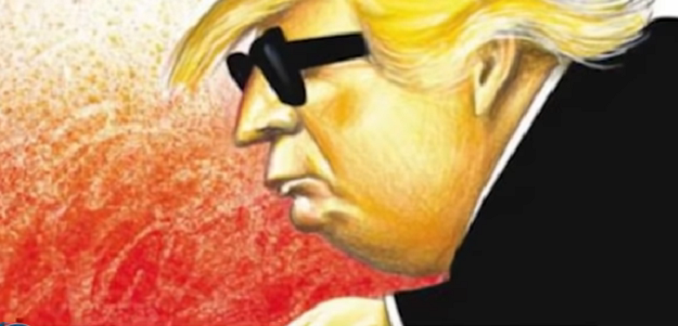The New York Times has been slammed for running in its international edition on Thursday an openly anti-Semitic cartoon that depicts U.S. President Donald Trump as a blind man wearing a Jewish skullcap, led by a guide dog with a Star of David collar and the face of Israeli Prime Minister Benjamin Netanyahu.
The cartoon appeared next to a column by Thomas Friedman about immigration in the opinion section of the paper.
After a barrage of criticism, The New York Times issued a statement on Sunday, saying, “We are deeply sorry for the publication of an anti-Semitic political cartoon last Thursday in the print edition of The New York Times that circulates outside of the United States, and we are committed to making sure nothing like this happens again.
“Such imagery is always dangerous, and at a time when anti-Semitism is on the rise worldwide, it’s all the more unacceptable,” it continued.
In its initial statement on Saturday, the Times acknowledged that the cartoon “included anti-Semitic tropes” but failed to apologize – a decision that was met with sharp condemnation.
“Apology not accepted. How many New York Times editors looked at a cartoon that would not have looked out of place on a white supremacist website and thought it met the paper’s editorial standards?” tweeted the American Jewish Committee. “What does this say about your processes or your decision makers? How are you fixing it?”
Bret Stephens, one of the paper’s op-ed columnists, criticized the cartoon and the newspaper’s general attitude toward Israel in a column posted Sunday.
“The almost torrential criticism of Israel and the mainstreaming of anti-Zionism, including by this paper, (…) has become so common that people have been desensitized to its inherent bigotry,” Stephens wrote.
He also argued that “anti-Zionism is all but indistinguishable from anti-Semitism in practice and often in intent, however much progressives try to deny this.”
Stephens added that the Times owed Netanyahu an apology and should reflect on “how it came to publish that cartoon — and how its publication came, to many longtime readers, as a shock but not a surprise.”
[Photo: ILTV ISRAEL DAILY / YouTube]




